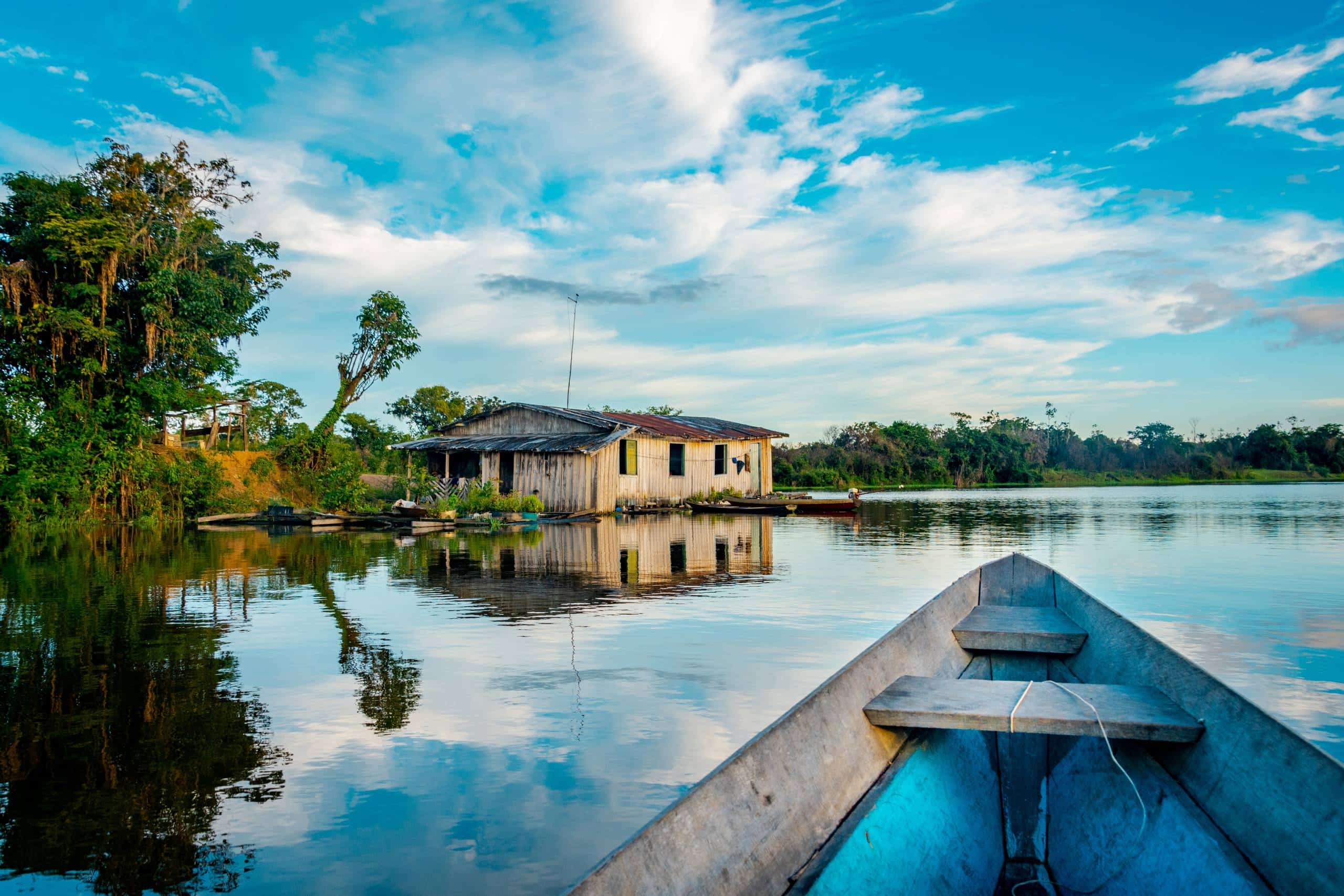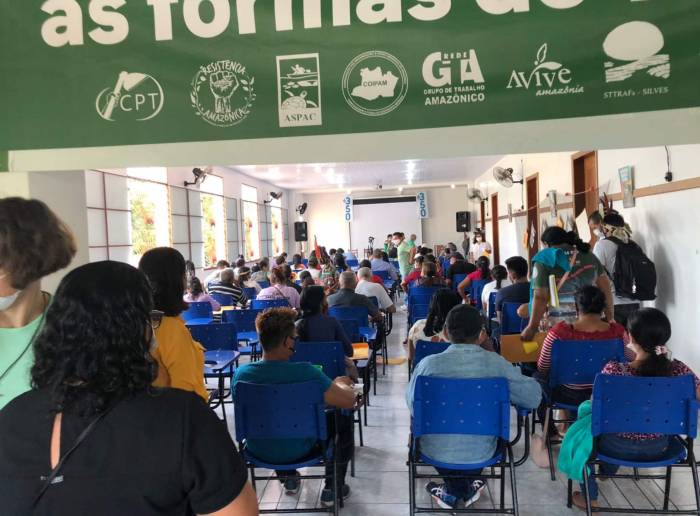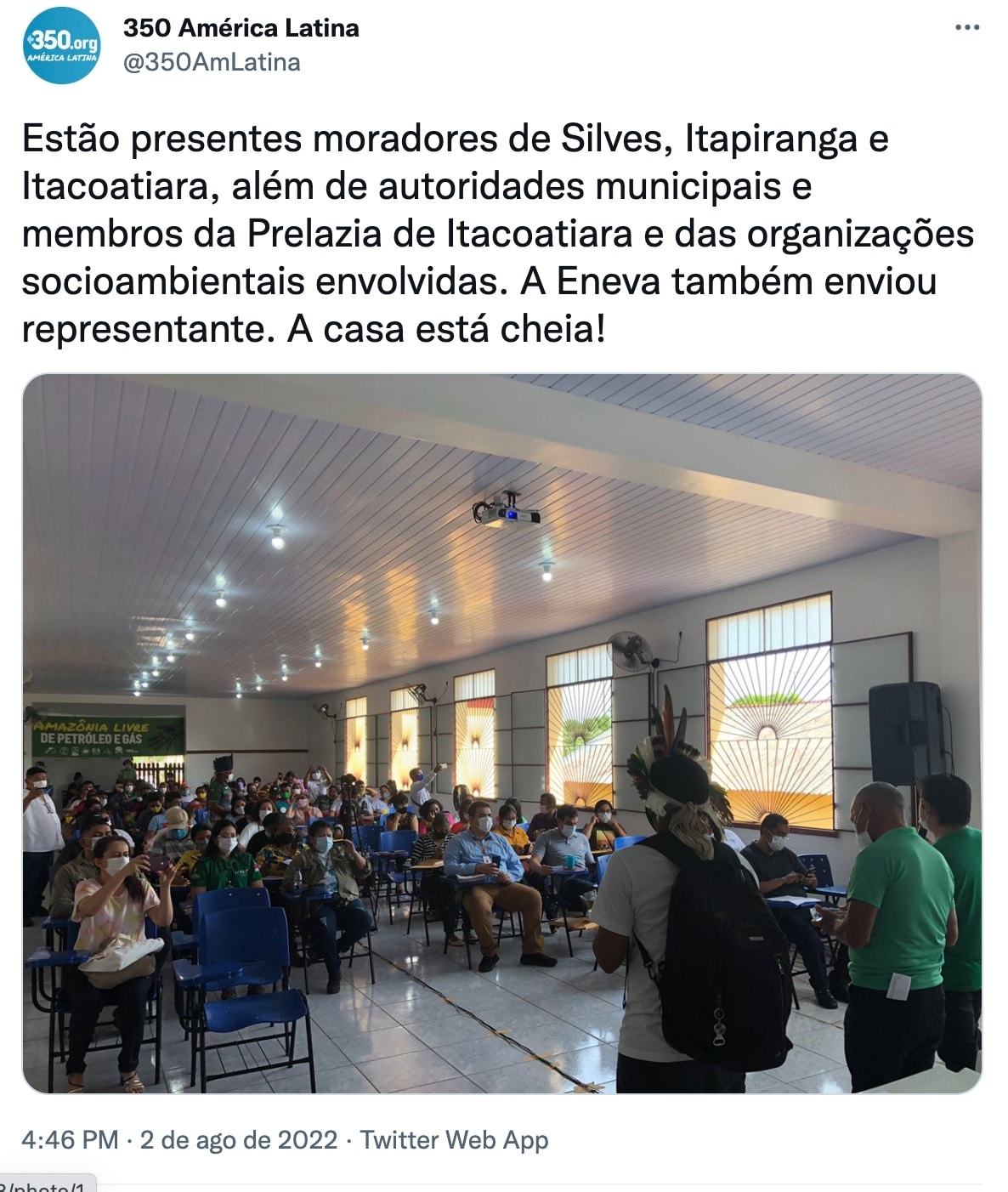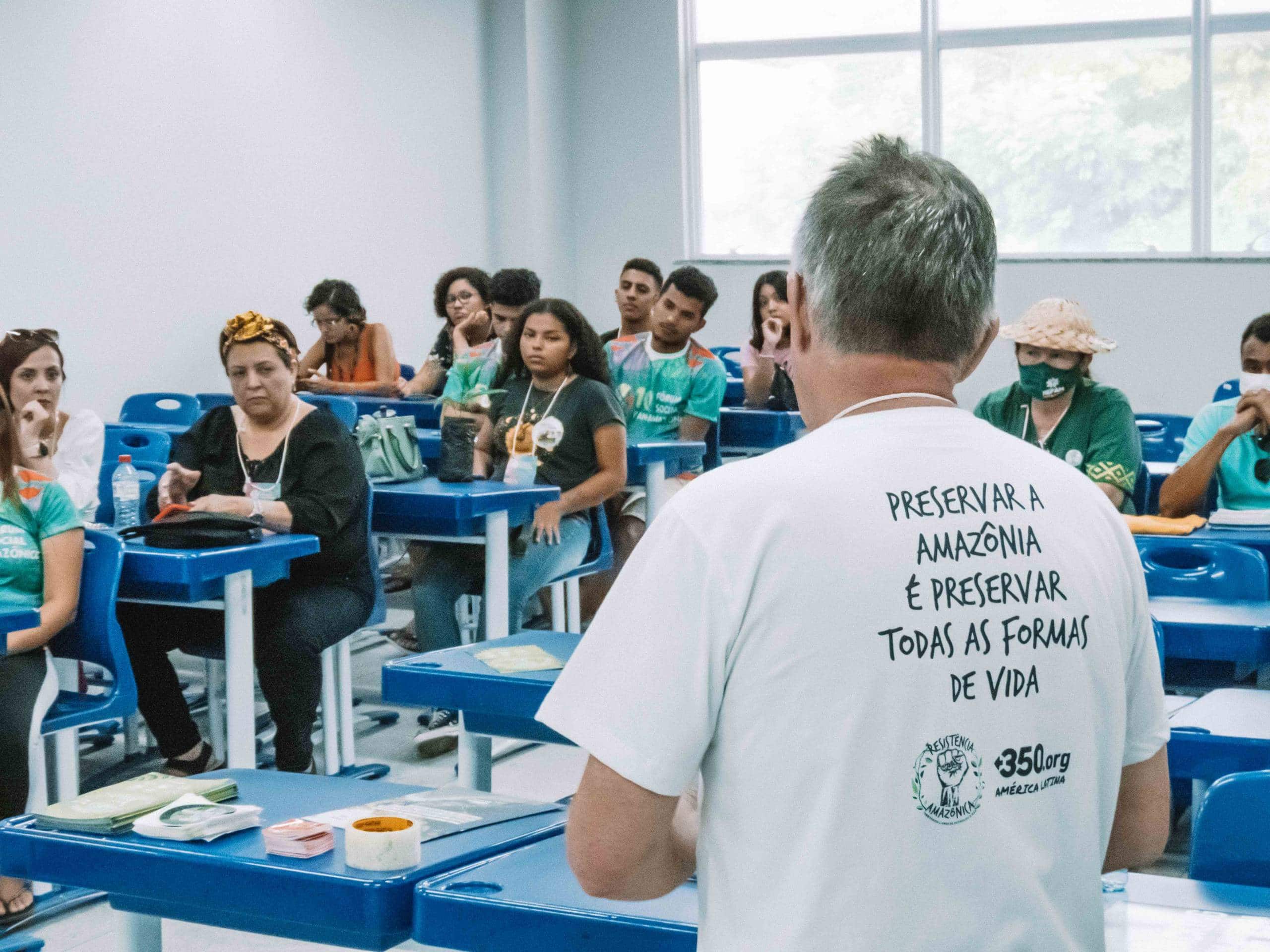Indigenous and Traditional peoples in the Brazilian Amazon continue to resist the destruction of the world’s largest rainforest. This resistance looks like taking to the streets, participating in public consultations, and celebrations.
The 5th of September is Amazon Day in Brazil — the perfect date to honour the leaders of this struggle and reflect on some major milestones.
Indigenous Peoples, Quilombolas, Riverine People, fishermen and other Traditional peoples’ mere existence in the forest’s territory often means confronting groups that see the Amazon as a supermarket of basic products for export.
The communities who have lived in this territory for generations are the ones who best protect and manage the forest. Destroying their way of life and casting them out enables deforestation, illegal extraction of minerals, and pollution of rivers – in short: it enables the looting of the forest responsible for regulating the Earth’s climate.

Navigation on a river in the Brazilian Amazon: According to researchers, Indigenous Lands are the most preserved areas of the forest. Photo credit: Sébastien Goldberg at Unsplash
The biggest threats are unregulated agriculture, illegal extraction of wood and minerals, and the buying and selling of land for future profits. These are not new problems, they have been bleeding the Amazon dry for decades. More recently, the destructive greed of fossil fuel companies has already wrecked parts of the Amazon in countries like Ecuador and Peru. Now, they are now trying to expand to Brazil.
At the frontline of this reality, Indigenous and Traditional communities are organising to demand the prohibition of oil and gas extraction in the Amazon. The impacts of fossil fuels are already being felt in the state of Amazonas, where people like the Mura had their lands co-opted and destroyed by gas company Eneva. As fossil fuel companies often don’t follow legislation or good corporate practices, the Mura were never consulted by the company.
The future holds even greater risks. Oil and gas companies plan to extract oil off the coast of the Amazon, building long gas pipelines and installing support structures. These projects end up attracting mass migrations without providing adequate living conditions and infrastructure.
In the face of this challenging and often dangerous scenario, celebrating the strength of Indigenous and Traditional communities and supporting their daily struggle is an essential way to contribute to social justice and an end to the climate crisis.
Here are three recent moments where Indigenous and Traditional peoples too action to keep the forest free from fossil fuels.
Three recent moments where Indigenous and Traditional communities in the Amazon resisted the expansion of oil and gas.
- Getting heard by governments and fossil companies

Full room in the auditorium in Silves (AM) that hosted the self-convened public hearing on the impacts of gas extraction in the south of Amazonas. Photo credit: Renan Andrade/350.org
Indigenous and Traditional communities in the south of the State of Amazonas found a way to make their demands reach local governments, as well as Eneva, a company that owns a Gas Treatment Unit (GTU) in Silves (AM) and is expanding its operations in the region.
Communities were tired of the lack of official public consultations on the impact of the Eneva project. Having signed and ratified Convention 169 of the International Labor Organization (ILO), Brazil has an obligation to guarantee such consultations, but the company and state and federal authorities disrespected – and continue to disrespect – this requirement.
The local population and members of the Mura Indigenous territory implemented a strategy to create a self-convened public hearing and broadcast their messages and demands until they were heard. On August 2nd, 2022, with support from a number of organizations including 350.org, the communities held the hearing in a local auditorium and recorded their speeches.
In response, Eneva sent a representative who both heard from residents about the damage brought about by the company in the region, and presented the company’s position on the subject. Representatives of the Federal Public Ministry, the prefectures of the municipalities of Itapiranga, Itacoatiara and Silves and the Institute of Environmental Protection of Amazonas (IPAAM) also attended.
Screenshot of @350AmLatina’s tweet about the public hearing in Silves.
The testimonials shared by community members expressed anguish at the absence of information about gas projects in the region, the high deficit of jobs, and the lack of transparent environmental licensing. They also pointed to problems caused by the Eneva operation, including frightening explosions and flashes at all hours of the day and night, scaring children and causing animals to flee, making hunting for subsistence difficult.Eneva has not yet taken any action to solve these problems. The company now have a responsibility to hold dialogue with affected residents. The authorities also have not promote changes, but they had to recognize the State’s inaction in the face of community demands. The struggle continues.
- Exposing the destructive hypocrisy of financial institutions

Screenshot of @Bahvegenata’s Instagram post about BTG Pactual.
The BTG Pactual, one of Brazil’s largest financial institutions, finances the extraction of oil and gas in the Amazon. Thus accelerating the climate crisis.
Ironically the BTG Pactual defines itself as a sustainable bank with an eye on the future. Exposing this hypocrisy is part of the current climate struggle. This is why, Chief Jonas Mura, leader of the Mura Indigenous people of southern Amazonas, went to protest in front of the BTG Pactual headquarters in São Paulo during COP26 last year. The Chief represented the Indigenous organizations COIPAM and FEPHAC, and alongside him were activists from 350.org.
In front of the mirrored building on Avenida Brigadeiro Faria Lima, Jonas Mura gave interviews and spoke with a representative of the bank’s sustainability sector, who committed to escalating the Chief’s demands within the bank.
Mura’s speech highlighted how Eneva’s operations impact the Indigenous peoples who have lived in the forest for many centuries, the global climate, and the local environment. However, the BTG Pactual refused to engage with Mura on the matter and did not respond to dialogue requests prompted by 350.org.
- Joining forces and celebrating life in the Amazon
View this post on InstagramLuiz Afonso Rosário, who co-runs 350.org campaigns in Latin America, likes to say that you can resist with joy. This phrase defines the spirit of many participants of the Pan-Amazon Social Forum (FOSPA), an event that brings together hundreds of socio-environmental activists from different countries, in Belém, from July 29-31, 2022.
For the residents of the Amazon who are frontline defenders of the forest, FOSPA is an important space for sharing experiences and knowledge. In debates, meetings and events, participants discuss their experiences, strategies for mutual collaboration, and reflect on their realities. They also take advantage of these gatherings to celebrate the beauty and strength of the diversity of cultures that continue to exist in the Amazon, despite all the challenges. Dancing, music and laughter are a firm part of this celebration.
One of the highlights of the 2022 FOSPA event, was the resistance of Traditional peoples to the fossil fuel sector, which has already caused serious and numerous attacks on the biome and on Indigenous and riverine peoples in Ecuador, Peru and Venezuela.350.org and its partners organized a debate on forms of resistance carried out by communities in various countries and the possibilities for action in Brazil. The aim was to alert Brazil about the consequences of the expansion of oil and gas in the Amazon.

Debate on forms of resistance to the extraction of fossil fuels in the Amazon brought together activists, indigenous people and students at FOSPA, in Belém. Photo credit: Tita Padilha/350.org
The Coordination of Indigenous Peoples and Organizations of Amazonas (COIPAM) and the Silves Association for Environmental and Cultural Preservation (ASPAC) coordinated the debate, in which Indigenous, riverside and academic representatives participated.Beyond the debates, hundreds of people marched through the centre of one of the largest cities in the Amazon biome with the sounds and colours of the forest. It was a protest, a party and a collective reaffirmation of life. When the very existence of a group becomes a threat to powerful economic and political interests, that group showing itself to be alive, with integrity, solidarity and integration is an incredibly powerful response. From the Indigenous chants sung in the street to the drums of the groups of young artists who joined the protest, the march in Belém was a representation of the Amazon that we want.
There were activists dancing carimbó, a rhythm from Pará that rocked most of the meetings at FOSPA. Check out this video of Dino do Clima below. From the pride and joy that comes with uniting for a fundamental cause comes strength to continue fighting for an Amazon free from the destruction of fossil fuels.
😆 E começamos a semana com o Dino do Clima 🦖tirando uma onda no carimbó paraense 🎶😍
Mas o que está acontecendo aí? Olha só 👇🧵 pic.twitter.com/t7XdazOsJB
— 350 América Latina (@350AmLatina) August 1, 2022
Get to know 350.org’s Amazon Resistance campaign and help pressure governments and companies for an Amazon free from oil and gas extraction!